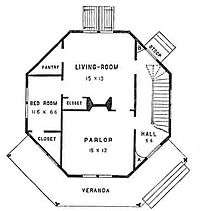Orson Squire Fowler


Orson Squire Fowler (October 11, 1809 – August 18, 1887) was a phrenologist and lecturer. He also popularized the octagon house in the middle of the nineteenth century.
Early life
The son of Horace and Martha (Howe) Fowler, he was born in Cohocton, New York, He prepared for college at Ashland Academy and studied at Amherst College, graduating in the class of 1834.
Career
With his brother Lorenzo Niles Fowler he opened a phrenological office in New York City. Orson wrote and lectured on phrenology, preservation of health, popular education and social reform from 1834 to 1887. Lorenzo and his wife Lydia Folger Fowler lectured frequently with Orson on the subject of phrenology.[1] The three were "in large measure" responsible for the mid-19th century popularity of phrenology.[2]
Orson edited and published the American Phrenological Journal, Philadelphia, Pennsylvania, from 1838 to 1842. He was a partner with Fowler & Wells, publishers, New York, from 1846 to 1854, residing in Fishkill, New York and Elizabeth, New Jersey. His sister, Charlotte Fowler Wells, and her husband, were involved in the publishing house, and after it became a stock company, she served as president.
He moved his office to Boston, Massachusetts in 1863, residing in Manchester from 1863 to 1880. He resided in Sharon, New York from 1883 until August 18, 1887, when he died.[3]
Personal life
Fowler was married three times: to Mrs. Eliza (Brevoort) Chevalier; to Mrs. Mary (Aiken) Poole; and to Abbie L. Ayres. He had three children.
Legacy
The town of Fowler, Colorado is named for Fowler.[4] Fowler too had an influence on modern psychology. He is remembered as a man of universal reform who preached for education, temperance, and equality. Orson, like his sister-in-law Lydia Fowler, held forth for the equality for women at a time when women had virtually no legal rights in the United States. Orson stood for children's rights when child labor was quite acceptable in the burgeoning industrial factories of his country. Fowler as a book seller and publisher was crucial in the original publication of Walt Whitman's Leaves of Grass and other works.[5]
Books
- Memory and intellectual improvement (1841)
- Physiology, Animal and Mental (1842)
- Matrimony, or Phrenology applied to the Selection of Companions (1842)
- Self Culture and Perfection of Character (1843)
- Education and Self-improvement
- Hereditary Descent, its Laws and Facts applied to Human Improvement (1843)
- Religion; Natural and Revealed (1844)
- Love and Parentage (1844)
- Maternity: or the Bearing and Nursing of Children (1848)
- The Octagon House: A Home for All (1848, the 1853 edition reprinted with new illustrations 1973)
- The Self Instructor in Phrenology and Physiology (1849), with Lorenzo Fowler
- Sexual Science (1870)
- Phrenology proved, illustrated and applied
- Amativeness
- Human Science of Phrenology(1873)
- Creative and Sexual Science, or Manhood, Womanhood, and their Interrelations (1875)
See also
- Octagon house for more information on Fowler's architectural influence
References
- ↑ "Noted Phrenologist Dead: Lorenzo N. Fowler Succumbs to a Paralyzing Stroke" (obituary), The New York Times, 4 September 1896.
- ↑ Engs, Ruth Clifford. Clean Living Movements: American Cycles of Health Reform, p.71, "The Fowlers" in "Inherited Realities, Phrenology, and Eugenic Undercurrents". Greenwood (2001).
- ↑ Orson Squire Fowler at Find a Grave
- ↑ "FowlerColorado.com
- ↑ Madeleine, Stern (1971). Heads & Headlines: The Phrenological Fowlers. University of Oklahoma Press. pp. 99–123. ISBN 0-8061-0978-5.
- Applegate, Debby. The Most Famous Man in America: The Biography of Henry Ward Beecher. Doubleday, 2006.
External links
- Martin, John H. Orson Squire Fowler: Phrenology and Octagon Houses
- Works by Orson Squire Fowler at Project Gutenberg
- Works by or about Orson Squire Fowler at Internet Archive
- Fowler, Colorado; named for O.S. Fowler
- Inventory of octagon houses